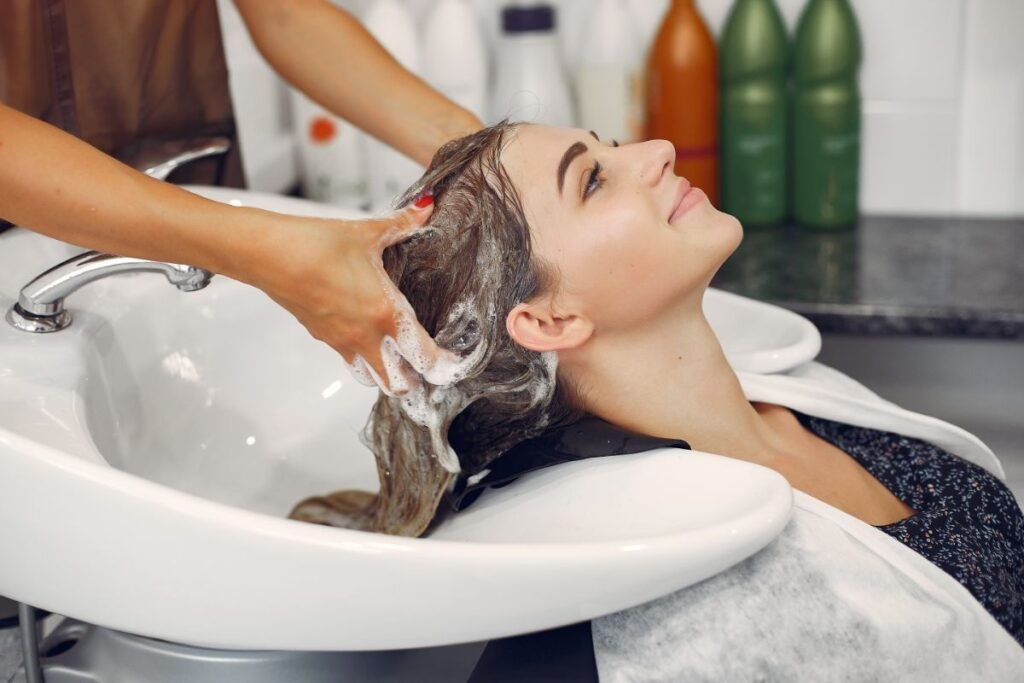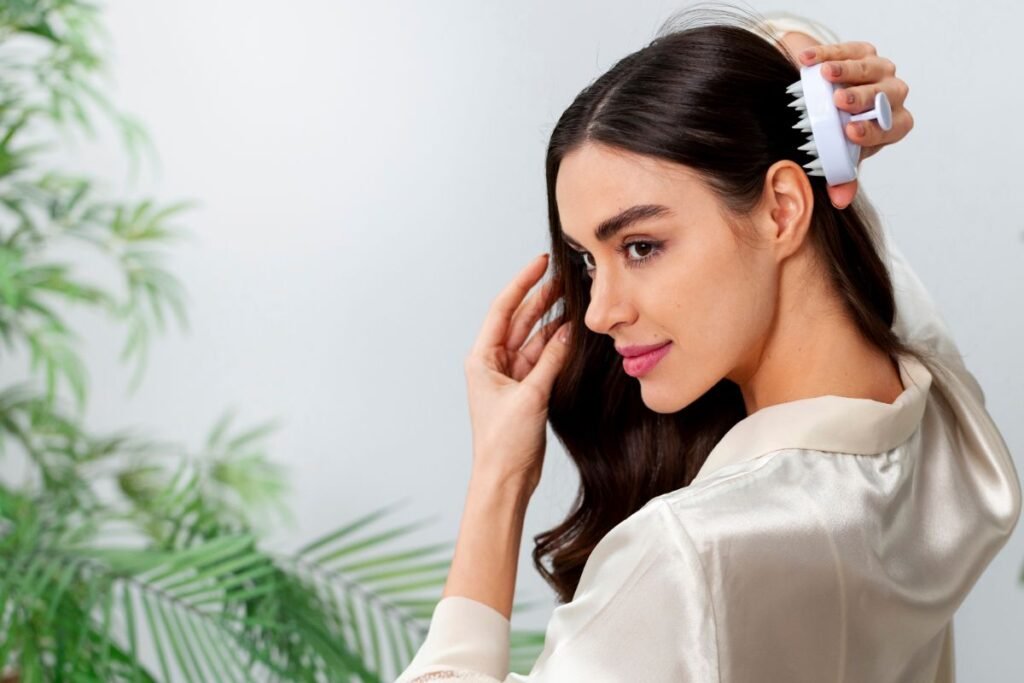Hair Care Routines and Professional Techniques

Hair care is a key part of our daily routine, yet it’s often overlooked or misunderstood. Whether you’re aiming for silky smooth hair, huge curls, or just healthy hair overall, knowing how to care for your locks is critical. In this article learn detail overview hair care.
understanding Your Hair Type
Identifying Hair Types
Before you can properly care for your hair, you need to understand its type. Is your hair straight, wavy, curly, or coily? Each type has unique characteristics and requires different care routines.
Tailoring Care to Hair Types
Once you’ve identified your hair type, you can tailor your hair care routine to meet its specific needs. For example, curly hair often needs more moisture, while straight hair may require more frequent washing.
Essential Hair Care Products
Shampoos and Conditioners :Choosing the right shampoo and conditioner is the foundation of any good hair care routine. Look for products that suit your hair type and address specific issues like dryness or dandruff.

Hair Masks and Treatments :Hair masks and treatments can provide deep conditioning and nourishment. They are particularly beneficial for damaged or color-treated hair.
Leave-in Conditioners and Serums :Leave-in conditioners and serums can add an extra layer of protection and hydration, keeping your hair smooth and frizz-free throughout the day.
Heat Protectants :If you use heat styling tools, a heat protectant is a must. It helps to shield your hair from the damaging effects of heat.
Styling Products :From mousses to gels to hairsprays, styling products can help you achieve the look you want while providing hold and texture.
Daily Hair Care Routine
Morning Routine :Start your day with a gentle brush to detangle your hair. Apply any necessary styling products and consider a quick touch-up with a straightener or curler if needed.

Night Routine :Before bed, brush your hair again to remove any tangles. Apply a leave-in conditioner or oil to the ends if your hair feels dry, and consider using a silk pillowcase to reduce friction.
Weekly Hair Care Routine
Deep Conditioning :Once a week, treat your hair to a deep conditioning session. This will help to restore moisture and repair damage.
Scalp Treatments :A healthy scalp is the foundation of healthy hair. Use a scalp treatment or exfoliator to remove buildup and promote circulation.
Hair Masks :Hair masks provide an intensive treatment that can address specific issues like dryness, damage, or color fading. Use them once a week for best results.
Seasonal Hair Care Tips
Summer Hair Care :In the summer, protect your hair from sun damage by wearing a hat or using a UV protectant spray. Consider washing your hair more frequently if you sweat a lot or swim in chlorinated pools.
Winter Hair Care :Winter can be harsh on your hair, making it dry and brittle. Use heavier conditioners and avoid going outside with wet hair to prevent it from freezing and breaking.
Tips for Humid Climates
Humidity can make your hair frizzy and unmanageable. Use anti-frizz products and consider hairstyles that keep your hair up and off your neck.
Tips for Dry Climates
In dry climates, focus on hydrating your hair with moisturizing shampoos, conditioners, and leave-in treatments.
Hair Care at Home
DIY Hair Masks :You don’t always need expensive products to care for your hair. DIY hair masks made from ingredients like avocado, honey, and yogurt can work wonders.
Natural Oils and Their Benefits :Oils like coconut, argan, and jojoba can provide deep moisture and shine. Apply them to your hair and scalp as a pre-wash treatment or leave them in overnight.
Home Remedies for Common Hair Problems :From dandruff to split ends, there are many home remedies you can try. For example, a mixture of apple cider vinegar and water can help with dandruff, while trimming your ends regularly can prevent split ends.
Professional Hair Care Techniques
Salon Treatments :Salon treatments like keratin treatments, deep conditioning, and scalp massages can give your hair a professional boost.
Haircuts and Trims :Regular haircuts and trims are essential for maintaining healthy hair and preventing split ends.
Coloring Techniques :If you color your hair, professional techniques like balayage, ombre, and highlights can add dimension and vibrancy.
Tips for Healthy Hair
Diet and Nutrition :Your hair reflects your overall health. Eating a balanced diet rich in vitamins and minerals can promote Healthy hair growth.
Avoiding Hair Damage :Be gentle with your hair. Avoid excessive brushing, heat styling, and harsh chemicals.
Proper Hair Washing Techniques :Wash your hair with lukewarm water and use a gentle shampoo. Focus on the scalp and let the suds run through the lengths of your hair.
Common Hair Care Mistakes to Avoid
Over-washing :Washing your hair too often can strip it of natural oils, leading to dryness and damage.
Excessive Heat Styling :Heat styling can cause significant damage if done too often. Always use a heat protectant and try to limit the use of heat tools.
Using Wrong Products :Using products that are not suited to your hair type or condition can do more harm than good. Choose products carefully based on your hair’s needs.
Hair Care for Different Age Groups
Hair Care for Kids :Children’s hair is delicate and requires gentle care. Use mild shampoos and avoid using heat styling tools.
Hair Care for Teens :Teenagers often experiment with different styles and colors. Encourage them to use protective products and maintain a healthy hair care routine.
Hair Care for Adults :Adults should focus on maintaining moisture and preventing damage. Regular trims and appropriate products are key.
Hair Care for Seniors :As we age, hair can become thinner and drier. Seniors should use moisturizing products and consider shorter styles to keep hair looking healthy.
Hair Care for Different Hair Types
Curly Hair :Curly hair needs extra moisture to keep it looking its best. Use leave-in conditioners and avoid products with sulfates.
Straight Hair :Straight hair tends to get oily faster. Use a light conditioner and avoid heavy products that can weigh it down.
Wavy Hair :Wavy hair is a mix of straight and curly. Use products that enhance your natural wave without making it frizzy.
Oily Hair :Oily hair is prone to dryness and breakage. Deep conditioning treatments and gentle handling are essential.
Hair Care for Different Conditions
Dry Hair :Dry hair needs extra hydration. Use moisturizing shampoos, conditioners, and leave-in treatments.
Oily Hair :Oily hair requires frequent washing with a clarifying shampoo to remove excess oil.
Dandruff :Dandruff can be treated with specialized shampoos and scalp treatments.
Hair Loss :Hair loss can be caused by various factors, including genetics and stress. Consult a professional for targeted treatments.
Quick Review
Caring for your hair doesn’t have to be complex. By understanding your hair type and needs, using the right products, and following a reliable routine, you can achieve healthy, beautiful hair. Remember, healthy hair is a image of your overall health, so take care of yourself inside and out avoiding excessive heat styling can help prevent split ends.
